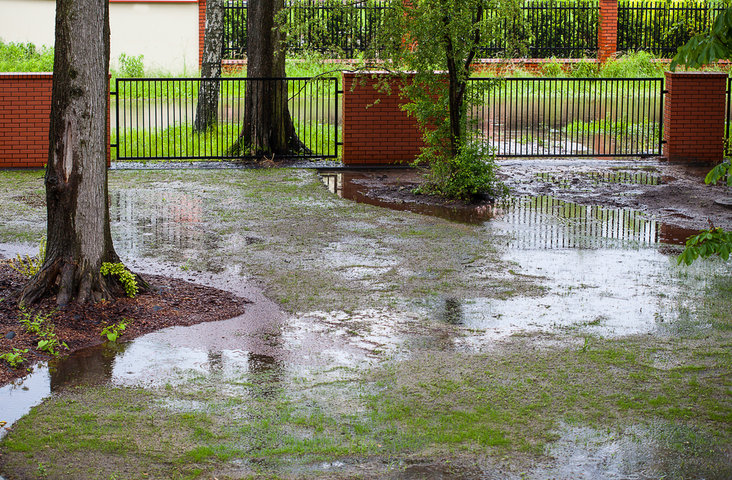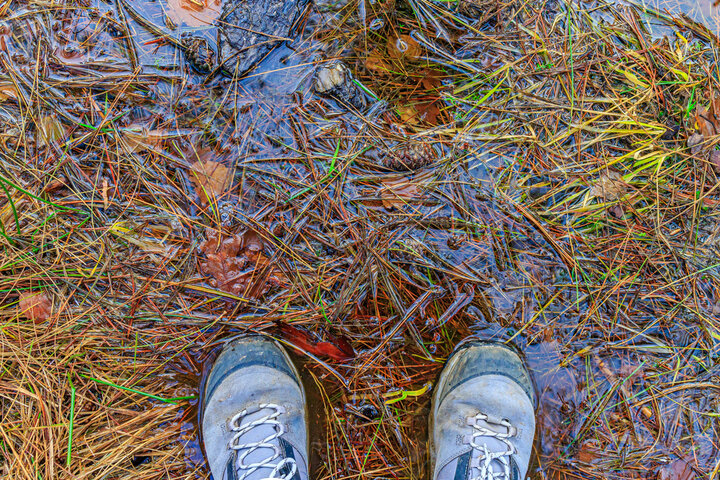Floods can devastate homes and gardens, which are a labor of love and a source of pride for many Syracuse residents. A flooded garden in Syracuse is not uncommon, especially after heavy rainfall or rapid snowmelt. Understanding the causes, preventive measures, and restoration techniques can help you protect and restore your green space to its former beauty after a flood.
What Are the Causes of a Flooded Garden in Syracuse?
Flooded gardens can result from various factors, including:
- Heavy Rainfall. Syracuse is no stranger to heavy rains, especially during spring and fall, which can quickly overwhelm soil and drainage systems.
- Snowmelt. The rapid melting of snow during Syracuse’s warmer months can lead to excessive water runoff, flooding gardens.
- Poor Drainage. Clay-heavy soil, compacted ground, and inadequate drainage systems can hinder water absorption and lead to flooding.

A flooded garden can be the result of melting snow.
Tips to Prevent a Flooded Garden
Panicking at the thought of losing your patch of earth? Don’t fear! There are several steps you can take to minimize the risk of flooding in your garden:
- Improve Drainage. Amend your garden soil with organic matter to enhance its structure and drainage. Consider installing French drains or raised garden beds to facilitate better water flow.
- Rain Gardens. Create rain gardens in low-lying areas of your yard to capture runoff and allow it to percolate slowly into the ground.
- Water-Resilient Planting. Select plants tolerant of wet conditions in areas prone to excessive saturation, such as Cardinal Flowers or Japanese irises.
Restoring a Flooded Garden in Syracuse
If your garden has been affected by flooding, here are steps to restore it:
- Safety First. Wait until the water recedes and the soil begins to dry before you start the restoration process. Be cautious of potential hazards like hidden sharp objects or contaminated water.
- Assess the Damage. Evaluate the extent of the damage to plants, soil, and garden structures. Some plants may recover, while others might need replacing.
- Remove Debris: Clear away any debris, silt, and mud that the flood has deposited in your garden.
- Test and Amend Soil. Floodwater can deplete soil nutrients and introduce contaminants. Test your soil for nutrient levels and potential contaminants like heavy metals or chemicals. Amend the soil with compost or other organic matter to restore its health.
- Prune Damaged Plants. Trim away damaged or diseased parts of plants to help them recover faster. However, give perennials and shrubs time to show new growth before deciding if they need to be pruned or replaced.
- Prevent Disease. Apply fungicides if necessary to prevent disease outbreaks, which can be common after flooding due to increased moisture levels.

To ensure the soil is healthy for planting, it’s a good idea to test its nutrients and check its temperature after a flood.
Working With a Flooded Garden
Floods can change the landscape of your garden, but they also provide an opportunity to start anew and rethink your garden design. Consider incorporating more flood-resistant features and plants that can withstand wetter conditions. Planting trees near the garden can also help excess water with draining. Additionally, working with nature by creating swales or rain gardens can protect your garden from future floods.
Remember, restoring a flooded garden in Syracuse requires patience and effort. It might take several seasons for your garden to fully recover, but with the right approach, you can bring it back to life and even improve its resilience against future floods. Whether you’re dealing with waterlogged beds, nutrient-depleted soil, or damaged plants, there’s always a way to rejuvenate your green space and continue enjoying gardening, even in the face of nature’s challenges.
Has a Flooded Garden Led to Property Damage? PuroClean of Syracuse North Can Help!
A flooded garden can have an impact on other areas of your Syracuse property, such as your foundation and basement. If you notice water damage signs in or around your home, PuroClean of Syracuse North is here to assist! As restoration experts, our certified professionals are available 24/7 to serve your water damage restoration needs. Please give us a call at (315) 314-9090 today!



 PuroClean of Syracuse North
PuroClean of Syracuse North